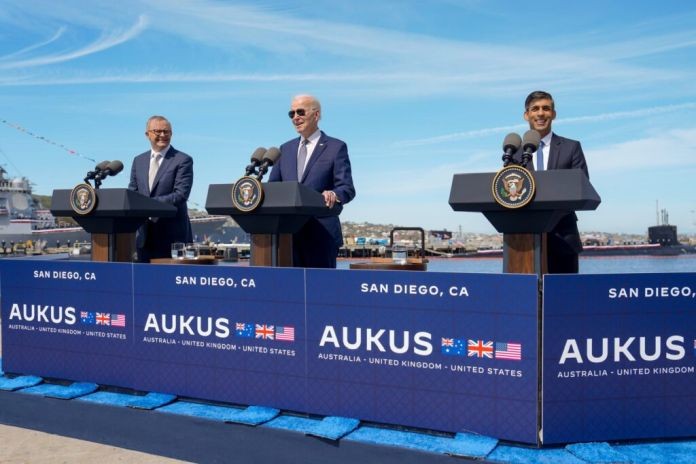By Derek McDougall
Prospects for AUKUS
While clearly AUKUS is a new development, we can ask whether this partnership is likely to endure. There are at least two aspects to consider: the submarine programme and the strategic impact.
With reference to the submarine programme, the most relevant factor to consider is the political situation in each of the three AUKUS countries. With a production schedule extending to the 2050s, there are many potential obstacles. One of these relates to possible political changes within each of the AUKUS countries. In Australia, both the Coalition and Labor parties have backed AUKUS, with some dissenting voices on the Labor side. At this point, it is difficult to see the critics gaining much political traction. In the UK, the Labour opposition has backed AUKUS but with some critics on the left.
A Labour government under Keir Starmer is likely to continue support for AUKUS. Since Australia is effectively subsidising submarine construction at Barrow, the argument that the UK cannot afford the huge expense of expanding its fleet of nuclear-powered submarines is undermined to some extent. However, there is still the argument that even with the Australian subsidy what the UK is attempting is too ambitious in the constrained post-Brexit economic circumstances.
Book Review – Sub-imperial power: Australia in the international arena
Round Table Podcast – Australia and South Pacific in an era of increasing strategic rivalry
From the perspective of Australian defence industry, there are questions concerning the development of the capacity required to build nuclear-powered submarines in Adelaide. Prime minister Albanese has compared the project to the development of a car industry in Australia in the post-war period (Albanese, Citation2023). Australia currently lacks the personnel and technical capacity to undertake projects in this area, having eschewed the use of nuclear power and the development of civilian nuclear industry in the past. There is also a massive challenge for the Royal Australian Navy to recruit and train personnel who can operate the nuclear-powered submarines.
From a political perspective, a major difficulty is anticipating the unfolding of US politics, given the continuing strength of Donald Trump and Trumpism. With the ‘America first’ mindset there might be an argument that the US (again allowing for the Australian subsidy of US shipyards) is being too generous to its AUKUS allies. This could lead to the modification or even abandonment of the AUKUS project.
On the question of the strategic impact of AUKUS, the key question is whether this partnership will constrain China significantly. Here, we should say that cooperation among the AUKUS countries and associated partners and allies is likely to endure irrespective of AUKUS itself continuing. AUKUS could remain even if the submarine plan were significantly modified, focusing on its role as a cooperative arrangement for developing advanced defence technology.
Whether or not AUKUS remains strong as a grouping, it needs to be set alongside the other factors in the region that contribute to China’s balancing. Most significant here would be the strength of other powers that might concurrently engage with but also limit China. This includes not just the US and other major powers such as Japan and India, but significant regional powers such as Australia, Indonesia and South Korea; the position of all powers, whether large, middle or small, needs to be assessed. Extra-regional powers such as the UK, France and the European Union can be relevant.
Geopolitics in the region is more than China versus the US. The range of groupings in which the countries of the region participate is relevant. The Commonwealth is not particularly important in this context, but CHOGM would be one context where a range of regional leaders can interact on Asia-Pacific and Indo-Pacific security issues if they so wished.
This is an excerpt from an article in The Round Table: The Commonwealth Journal of International Affairs.]
- Derek McDougall is with the School of Social and Political Sciences, University of Melbourne, Melbourne, Australia.







